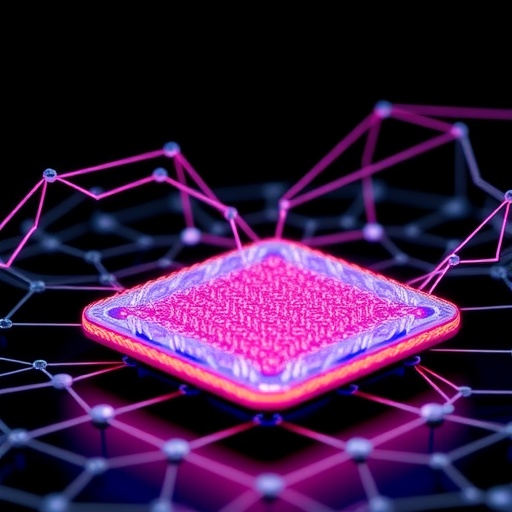In recent advancements in battery technology, researchers have made significant strides in optimizing the performance of lithium iron phosphate (LiFePO₄) cathodes, particularly at low temperatures. This enhancement is critical for various applications, especially in electric vehicles and energy storage systems, where environmental conditions can significantly impact battery efficiency. The work led by Wang, Cai, and Tang delves into novel methodologies that leverage reduced graphene oxide (rGO) to create a ternary point-line-plane conductive network, aiming to improve the electrical conduction pathways within LiFePO₄ electrodes.
The primary challenge facing LiFePO₄ cathodes at low temperatures is their intrinsic conductivity limitations. Traditional methods of addressing this issue have often involved the addition of conductive agents and various coatings, but these strategies can sometimes compromise the structural integrity of the cathode or lead to other undesirable side effects. This innovative study proposes a more systematic approach: by constructing a highly conductive rGO network, researchers aim to facilitate electron transfer across the electrode material without detracting from its structural performance.
The large-scale production of rGO utilized in this research plays a pivotal role in realizing an effective conductive network. The method developed not only focuses on the reduction of graphene oxide to enhance its electrical properties but also emphasizes scalability, making it feasible for commercial applications. The rGO network created allows for a continuous conduction pathway that connects multiple LiFePO₄ particles, thereby reducing resistance and improving overall charge/discharge performance.
A key component of the study is the investigation into how the three-dimensional structure of the rGO network contributes to effective electron transport. The ternary point-line-plane model used by the researchers details how electrons can efficiently navigate through different conductive paths, settling on the optimal routes for travel between the active materials. This elegant design is essential for maintaining high conductivity across the entire electrode, particularly as temperatures drop.
Experimental results demonstrate significant improvements in both electrochemical performance and structural stability. The researchers found that batteries constructed using the optimized LiFePO₄ enabled by the rGO network exhibited markedly better capacity retention and cycling stability under low-temperature conditions compared to conventional cathodes. This achievement may resolve longstanding issues regarding battery performance in colder climates, broadening the potential applications of LiFePO₄ batteries.
The implications of these findings extend far beyond merely enhancing battery performance. A more efficient low-temperature cathode can lead to lighter battery designs, enabling advancements in energy density and overall energy storage efficiency. This is particularly important for electric vehicles, where performance in colder temperatures can greatly affect range and user experience. A reliable low-temperature performance could make electric vehicles more appealing to a broader consumer base, driving further adoption of sustainable technologies.
Moreover, the economic viability of producing rGO at scale represents a leap forward for the battery industry. By increasing accessibility to such advanced materials, manufacturers could reduce production costs and promote wider utilization of high-performance batteries. This could foster further innovation and investment in energy storage solutions, targeting everything from mobile devices to grid storage systems.
Collaboration across disciplines—particularly between materials science and engineering—has been crucial in advancing this research. The multidisciplinary approach has enabled the team to explore the complex interactions that occur within the battery system, paving the way for potential future breakthroughs in other materials or chemistries. Insights gained from this study could have far-reaching effects, potentially influencing how scientists and engineers design next-generation batteries.
As the global focus shifts toward cleaner energy solutions, optimized battery technology becomes increasingly critical. The ability to develop batteries that perform well under a range of environmental conditions will be vital to achieving energy efficiency goals and reducing reliance on fossil fuels. The strategies outlined in this research could serve as a model for future developments within the burgeoning field of battery technology.
In sum, this research represents a meaningful step forward in enhancing the practicality of LiFePO₄ as a cathode material. The successful integration of large-scale reduced graphene oxide into a ternary conductive structure signifies a promising advancement capable of transforming how we think about battery performance under low temperatures. As the industry gears up to implement these findings, the future of energy storage looks brighter, suggesting a more sustainable and efficient energy landscape on the horizon.
In conclusion, the innovative strategies discussed here not only enhance the immediate performance of lithium iron phosphate cathodes but also pave the way for a broader adoption of renewable energy technologies. With ongoing research and dedication to sustainable solutions, the potential for smart energy systems continues to expand, showcasing a future where such technologies are integral to our daily lives.
Subject of Research: Enhanced low-temperature performance of LiFePO₄ cathodes
Article Title: Enhanced low-temperature performance of LiFePO₄ cathode via large-scale production of reduced graphene oxide-based ternary point-line-plane conductive network.
Article References:
Wang, S., Cai, X., Tang, J. et al. Enhanced low-temperature performance of LiFePO₄ cathode via large-scale production of reduced graphene oxide-based ternary point-line-plane conductive network. Ionics (2025). https://doi.org/10.1007/s11581-025-06777-1
Image Credits: AI Generated
DOI: https://doi.org/10.1007/s11581-025-06777-1
Keywords: LiFePO₄ cathodes, low-temperature performance, reduced graphene oxide, ternary conductive network, battery technology, electric vehicles, energy storage solutions.




